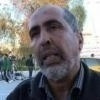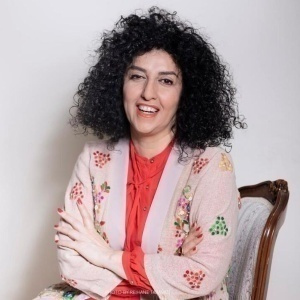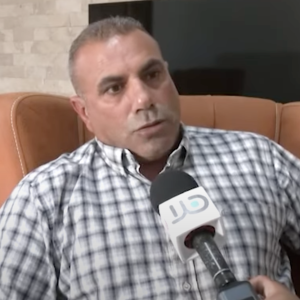For Narges Mohammadi - born in Zanjan on April 21, 1972 - there is just one way of living: fighting against the Islamic theocracy of Iran, to protect her and others' rights. And she does this without any caution. Like a tightrope walker going on a rope without using a protective net. A week before her 50th birthday, she "celebrated" with a video-appeal addressed to all human rights activists and defenders. It was recorded on April 21, 2022, when she was forced to come back to jail after another 8-year prison sentence for alleged crimes against Iran's national security. Although imprisonment, isolation, torture and illness have marked her existence, in the video she looks strong. Inexplicably resistent to the brutality of the Iranian regime. Under her dark and curly hair, with a serious but apparently serene face, in the video posted online on April 21 - her birthday - by the humanitarian organization Front Line Defenders, she says: "Dear Human Rights Defenders, I am very happy to share this video-message with you today, on the occasion of my 50th birthday. Today, at 5 p.m., I will head to prison, just like so many other times, but I am full of hope and free of any concern or frustration."
Narges Mohammadi was
arrested 12 times, sentenced to a total of 30 years of prison, in
addition to many lashes. An activist since she was a university
student and founder of the "Enlightened Students" group,
she recalls her latest campaign against white torture, promoted after her release due to
serious health conditions: "Before I was
arrested in November last year, together with 85 other activists we
started a campaign called White Torture against the use of isolation
in Iranian prisons. We believe this practice must be stopped because
it is a serious violation of human rights. Four months ago I was held
in isolation for more than two months in the 209 division of Evin
Prison."
In 2008 Narges
Mohammadi became vice-president of DHRC, Defenders of Human Rights
Center (founded by Nobel Peace Prize winner Shirin Ebadi), which
defended political prisoners and prisoners of conscience in judicial
proceedings as long as it could. Narges Mohammadi has been in and out
of prison since the 90s and has always been at the forefront in the
battle in the streets against the law forcing women to wear the
hijab. A battle which also sparked the latest resounding wave of
protests that erupted after Mahsa Amini's murder on September 16,
2022, led by a new generation willing to go all the way to end the
dictatorship of the Islamic Republic. And a powerful slogan,
widespread in squares all over the Western world: “Zan, Zendegi,
Azadi - Woman, Life, Freedom."
Watching the video
recorded just few days before she came back to prison, it’s hard to
compare the picture of her vital face with the one showing her
motionless body in bed two years earlier, when she was beaten by the
warden of Evin Prison for organizing a protest against the crackdown
on the 2019 demonstrations. She has an exasperated strength which, as
soon as she was released in 2020, made her write two books and
realize a documentary about white torture, in which she described the
suffering she experienced in isolation. In her description of white
torture, with several interviews with activists and dissidents, she
wrote: "Isolation means being locked in a very small space. Four
walls and a small iron door, all the same color, white most of the
times. No natural light inside the cell. No fresh air. You can't hear
any sound and you can't talk or have contacts with other human
beings. You have nothing but three thin, consumed blankets, a shirt
and pants. Interrogations are conducted with threats, intimidation
and pressure. Prisoners are subjected to false accusations and
psychological pressure to force them into false confessions. There is
no contact with family, friends or lawyers. Loneliness and impotency
consume the human mind day after day."
Narges Mohammadi
dedicated her whole life to fighting Iran's theocracy and its laws
that imposed the hijab as the banner of oppression. She has been in
and out of prison since the 1990s, when she had supported the
election campaign of reformist Mohammad Khatami, who was elected
president in 1997 and 2001 thanks to the vote of women and young
people who had the illusion that they would get reforms and more
rights for women. Arrested again in 2010 with other activists from
the Defensor of human rights center founded by lawyer and Nobel Prize
Shirin Ebadi, in 2011 she was sentenced to 11 years in prison for
conspiring against national security. In 2012, after muscle
paralysis, she was released due to her health problems. Married to the
journalist Taghi Rahmani - a dissident politician who was imprisoned
for 14 years before being forced into exile in France where he lives
with their twin children - for years she opposed the death sentences
that have never been stopped, even against minors, and denounced the
judicial officers who authorized isolations, white torture and
arrested people from the previous wave of protests in 2019.
Mohammadi was taken
to Evin Prison in May 2015, where she was held until December 2019,
when she was moved to Zanjan Prison, about 300 km from Tehran, after
organizing protests against prison conditions and the killing of
hundreds of protesters in November 2019. Following her last release
in October 2020, Narges Mohammadi received death threats from
security forces and was arrested several times, even for a single
day. Narges Mohammadi denounced intelligence agents who subjected her
to torture and other mistreatment, brutally ripping off her hair, a
misogynistic obsession of the Islamic Republic of Iran.
It is difficult to
understand her almost exasperated strength. Even her husband, during
a conversation on March 11, 2022, at the Geneva International Film
Festival and Forum on Human Rights about Narges Mohammadi's
documentary on white torture, said: "I tried to tell her to calm
down sometimes, but from her incarcerations she finds the lifeblood
to keep going." Despite her neurological disease, muscle spasms,
every time she is released she starts fighting for human rights
again. In jail she also gets to know many ordinary prisoners and
takes on her shoulders the burden of all the people she meets to
defend their rights against the Islamic Republic. And every time she
goes against the regime, she is punished. "They even charged her
for participating in a protest for Afghan women," recalled her
husband, explaining where her motivation to become one of the
regime's most feared Iranian dissidents could have stemmed from:
"Several of Narges' family members were imprisoned or sentenced
to death after the Islamic Republic took over." Although it is
still difficult to see where such overwhelming strength comes from.
Narges Mohammadi,
who was released after a five-year imprisonment in October 2020,
suffers from a neurological disorder that can cause seizures,
temporary partial paralysis and a pulmonary embolism. Her book about white torture, written in the brief moment of freedom
she obtained after the heart surgery, begins with these words: "I am
writing this foreword in the last hours of my leave. Very soon I will
be forced to return to prison. This time I have been found guilty
because of the book you have in your hands: white torture." In
October 2022, she was sentenced to 15 months in prison with the
accuse of "propaganda against the system" for expressing
her support for the people's right to demonstrate. While detained
with 300 other women in Evin Prison, she keeps on writing letters and
appeals for the arrests made after the uprising which followed the
murder of Mahsa Amini. And she managed to send a letter to the Nouvel
Observateur through her husband Taghi Rahmani to let the world know
how Evin jail had become a battlefield on the night of October 15.
In mid-December
2022, on his Instagram profile appeared a post: "The Iranian
people have paid a very high price to fight tyranny and religious
regime. We are witnessing a huge effort to achieve democracy and
respect for human rights. And now that women are sacrifying their
lives so they can choose what to wear, it is difficult to talk about
freedom of expression. After years of imprisonment, I am back in
jail, deprived even of the ability to hear my children's voices, but
my heart is full of passion and hope. We seek victory and the defeat
of tyranny once and for all." Messages about what is happening
in Evin Women's Prison, appeals for those sentenced to death or
stories of women arrested for daring to making war on Allah and
detained without due process often appear on her Instagram profile.
It’s like a radio from prison that helps to measure the Iranian
regime's rebellion and repression.
On October 6, 2023, Mohammadi received the Nobel Peace Prize "for her struggle against the oppression of women in Iran and for promoting human rights and freedom for all."
The photo on the cover is courtesy of Taghi Rahmani.
















